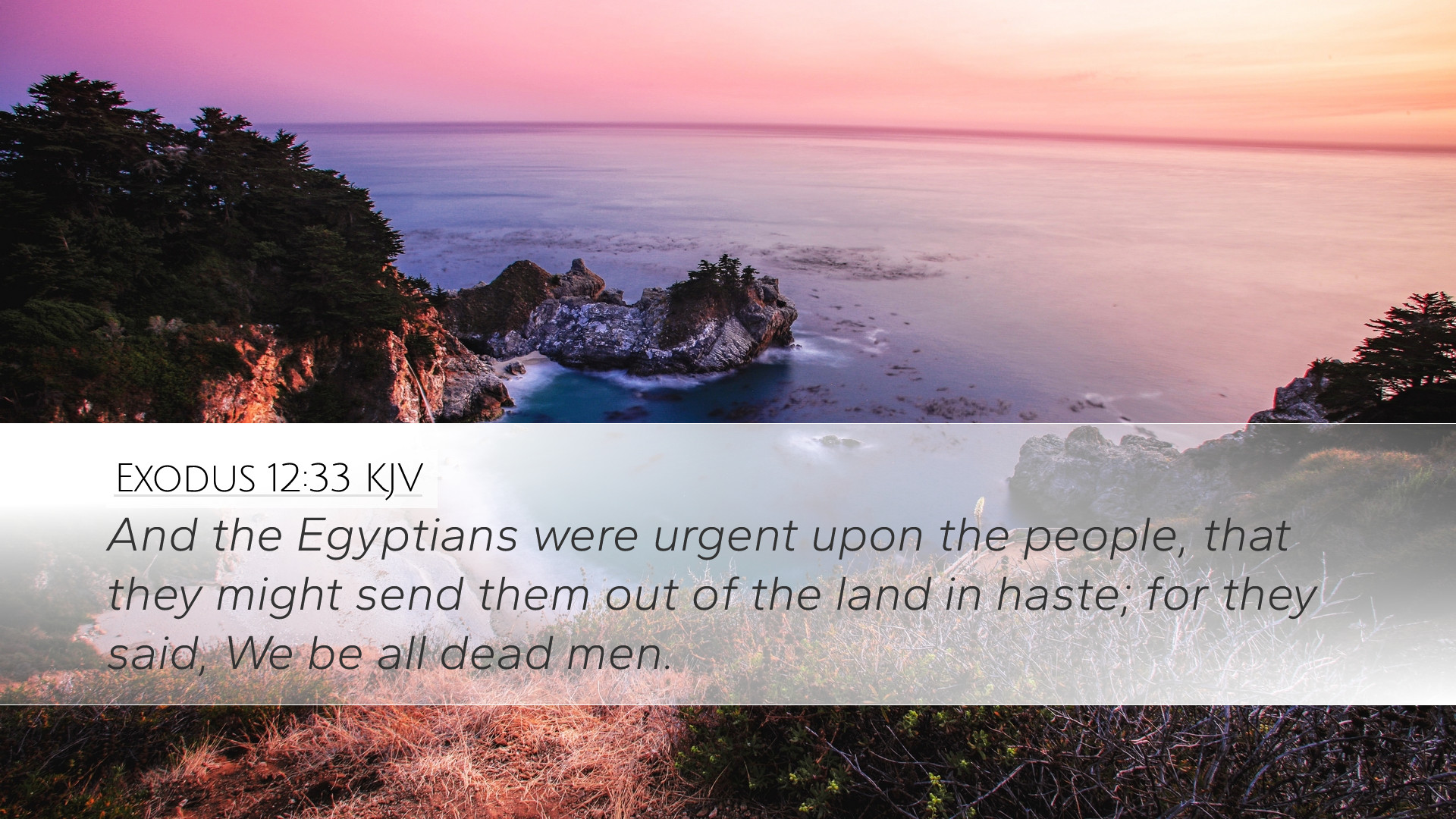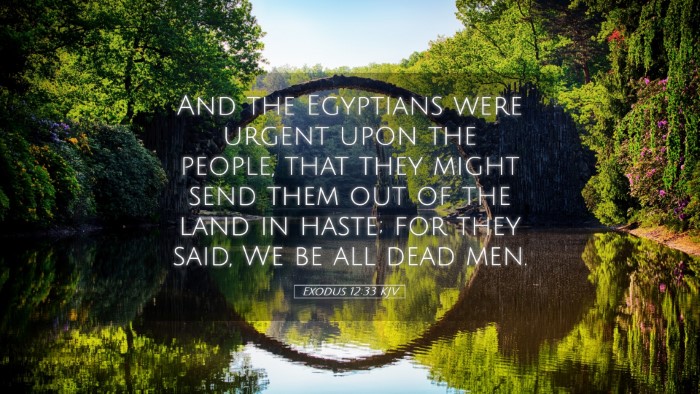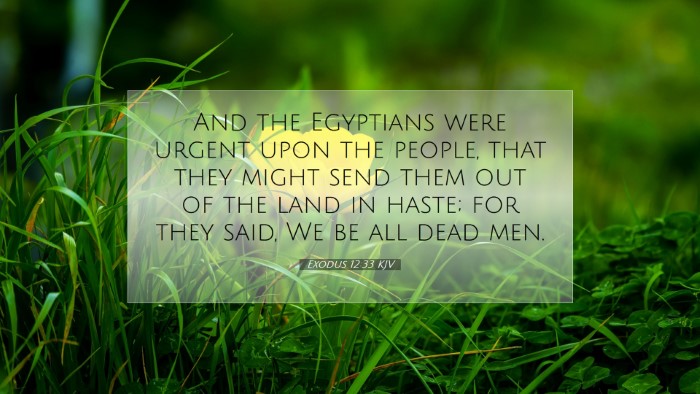Commentary on Exodus 12:33
Exodus 12:33 states: "And the Egyptians urged the people, that they might send them out of the land in haste; for they said, We be all dead men." This verse encapsulates a pivotal moment in the narrative of the Exodus, where the resolve of the Egyptians shifts dramatically due to the weight of the plagues.
Contextual Background
The narrative leading up to Exodus 12:33 involves the culmination of the ten plagues, each serving as a demonstration of God's power over the gods of Egypt and the stubbornness of Pharaoh's heart. After the final plague—the death of the firstborn—God's command for the Israelites to prepare for their departure is executed amidst the increasingly desperate pleas of the Egyptians.
Insights from Matthew Henry
According to Matthew Henry, this verse illustrates the immediacy of the Egyptian response to the calamities they faced. They recognized that their persistence in oppressing the Israelites had dire consequences, leading them to proclaim, "We be all dead men." This acknowledgment reflects both fear and the recognition of divine judgment. The urgency of their plea exhibits the fear of the Egyptians, fostering a sense of urgency in the departure of the Israelites.
Application of Fear and Urgency
Henry further notes that the Egyptians’ hastening of the Israelites out of their land is indicative of God's overarching plan for Israel's liberation. This moment serves as a lesson: when faced with divine displeasure, even the unyielding can become pliable. It also underscores how God's deliverance often comes through a mix of divine instruction and the frailty of human decision-making motivated by fear.
Insights from Albert Barnes
Albert Barnes underscores the phenomenon of urgency driven by desperation seen here. The Egyptians, realizing their impending doom, urgently seek to expel the Israelites from their land. Barnes expounds on the notion of collective fear among the Egyptians, who understood that the hand of the Lord was against them, prompting them to act swiftly.
The Role of Human Agency
Barnes highlights that while God orchestrated these events, the reaction of the Egyptians illustrates human agency and its consequences. They chose to act in haste, a reflection of their moral and spiritual state, which was deeply shaken by the plagues. This suggests a profound truth about how our choices can lead to unexpected outcomes.
Insights from Adam Clarke
Adam Clarke elaborates on the sociopolitical climate of the time, noting that the Egyptians’ desire to expel the Israelites was not only a reaction to fear but also a recognition of the lost status of Egypt as a dominant power. The plagues disrupted their society comprehensively, leading to economic and social turmoil.
Understanding Divine Discipline
Clarke comments on God's discipline as a means of correction for both the oppressors and the oppressed. In this verse, the Egyptians' acknowledgment of their plight serves as a pivotal lesson about repentance and recognition of divine authority. It illustrates that even in their desperation, the Egyptians were confronted with their transgressions and the efficacy of God's will.
Theological Implications
The theological implications of Exodus 12:33 are significant. This verse serves as both a climax in the story of Israel's liberation and a testimony to God's sovereignty. The fear-induced actions of the Egyptians highlight the reality that God's justice will ultimately prevail.
The Nature of God’s Deliverance
Pastors and theologians may reflect on this event as a portrayal of how God operates in human history—using even the hardened hearts of oppressors to fulfill His purpose. The rapid retort of the Egyptians is a testament to the power of God's judgment, compelling them to concede and thereby fulfilling God's promise to the Israelites.
Practical Reflections for Today
For contemporary believers and scholars, Exodus 12:33 serves as a reminder of the reality of spiritual urgency. The plight of the Egyptians can serve as an analogy for those who resist divine calling, emphasizing the need to respond to God's leading with immediacy and obedience.
Living with Urgency
As Christians engage with this text, it prompts a reflection on their own spiritual journey. Just as the Egyptians recognized the seriousness of their situation, believers today are called to assess their lives in light of divine expectations. The urgency for the Israelites became a means of deliverance, a principle applicable in the Christian faith wherein the readiness to respond to God's voice is paramount.
Conclusion
In summary, Exodus 12:33 encapsulates a pivotal transition marked by fear, urgency, and the undeniable hand of God. Insights from the public domain commentaries of Matthew Henry, Albert Barnes, and Adam Clarke provide a multi-faceted view of this critical moment in biblical history. For pastors, students, and scholars alike, the lessons contained in this verse are profound, reinforcing the interplay of divine action and human response.


